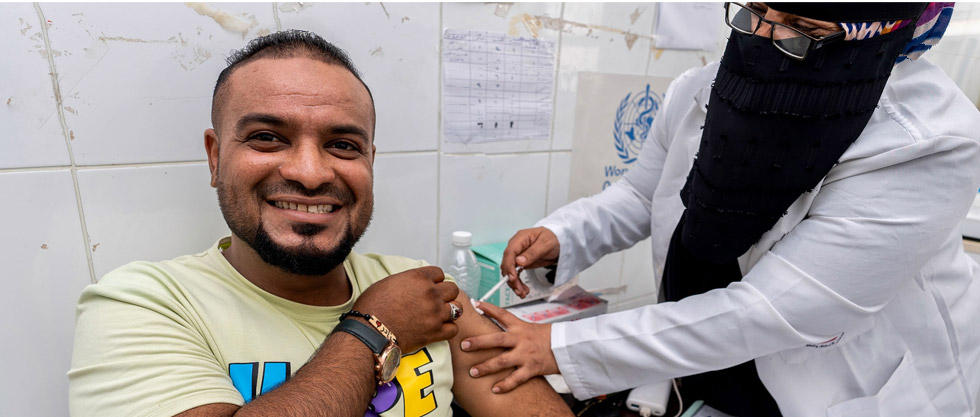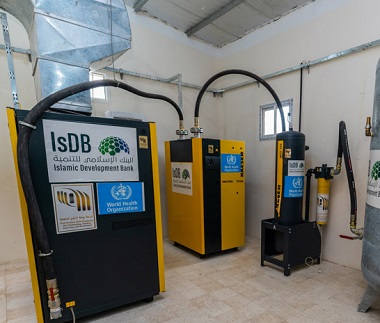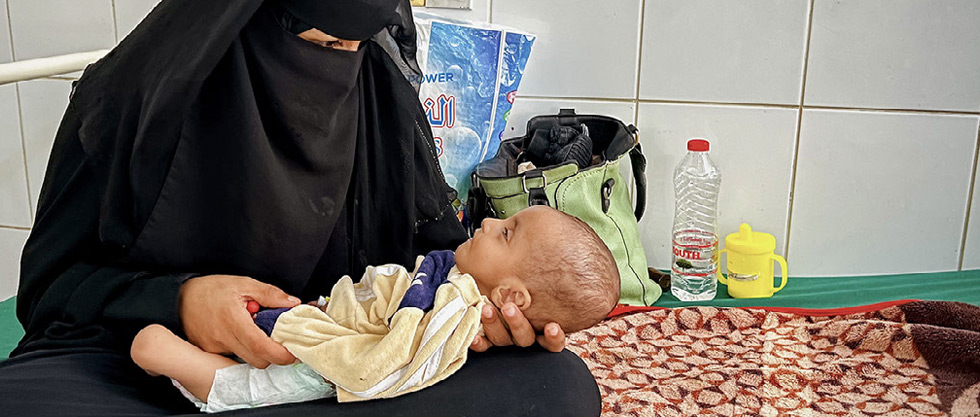Partnering to fight COVID-19

25 October 2022 – WHO in partnership with USAID has mounted successive COVID-19 vaccination campaigns that have immunized nearly 881,000 people to date in IRG-controlled Southern and Eastern Yemen. But vaccination progress has been continually slowed by misinformed and fear-based community rumors.
Only 10.7% of persons living in the 122 districts of 13 IRG-controlled governorates have received at least one dose of a COVID-19 vaccine delivered to Yemen through COVAX (a global initiative aimed at providing equitable public access to COVID-19 vaccines). Through COVAX, the US Government provided the Janssen vaccine to Yemen, which has accounted for 40% of all vaccinations currently. WHO co-directs the COVAX initiative with the GAVI vaccine alliance and other partners.
IsDB and WHO provide sustainable life-saving medical oxygen for millions in Yemen

Yemen, 11 October 2022 — The World Health Organization (WHO) and the Islamic Development Bank (IsDB) inaugurated 14 oxygen stations across Yemen this week. This life-saving intervention is the epitome of health systems strengthening and improving its resiliency in Yemen and is the fruit of the strategic partnership between WHO and IsDB. The establishment of the oxygen stations is part of a larger project: “IsDB Group Emergency Support for the COVID-19 Preparedness and Response Plan in the Republic of Yemen”, which was implemented in collaboration with the country’s Ministry of Health and Population, in close coordination with the Ministry of Planning and International Cooperation.
“Currently, oxygen in health facilities and hospitals is supplied to patients in standalone cylinders, usually provided at the patient’s bedside. But with the launching of these 14 oxygen stations, thanks to the support of IsDB, a total production capacity of 2200 cylinders of oxygen per day is now possible,” said Dr Adham Ismail Abdel-Moneim, WHO Representative in Yemen.
During the first half of 2022 alone, the hospitals where the oxygen stations were installed provided medical services for almost 400 000 patients, supporting an estimated 9000 major surgeries and 121 000 deliveries.
“The first oxygen station in the history of Socotra governorate was installed as part of this project. Not only will this station ease the suffering of people in Socotra, but it will also eliminate the burden and costs of transporting oxygen from the mainland to this island governorate,“ continued Dr Abdel-Moneim.
“This is a milestone intervention that will ensure that oxygen is produced in key health facilities across the country, ensuring millions of Yemenis receive medical oxygen continuously,” said Dr Ilker Ersegun Kayhan, IsDB Operations Team Leader for the Gulf Cooperation Council (GCC) countries and Yemen.
The stations will secure medical oxygen for 261 health facilities, benefiting an estimated 2.3 million people, ensuring vulnerable groups such as internally displaced persons, women of reproductive age, children under the age of five, and other groups with health conditions that may require oxygen support will be able to receive it.
“At Islamic Development Bank, we extend the support that looks future-forward, focused on longer-term sustainable solutions. Knowing that these stations will help many millions of men, women, and children in Yemen is astounding. The establishment of these stations ensures a legacy that will benefit the people of Yemen for years to come,“ concluded Dr Ilker Ersegun Kayhan.
At present, the Health Cluster in Yemen is only 13.3% funded, WHO and health partners continue to rely on support from partners to ensure the continuation of life-saving interventions in the country.
For more information, please contact:
M.A.DinMohammadi
IsDB Communications and Outreach Department
E-mail:
BISALINKUMI, Ezechiel
WHO International consultant, Technical support
E-mail:
WHO and KSrelief partner to sustain and strengthen essential health services in Yemen
10 October 2022 (Yemen) –The World Health Organization (WHO), in partnership with the King Salman Humanitarian Aid and Relief Centre (KSrelief), has successfully concluded the first 2-year phase of the Essential Health Services (EHS) Project, a joint endeavour that has sustained and strengthened Yemen’s fragile health system, in collaboration with local authorities and health partners.
Since December 2020, the EHS Project has ensured access to essential health services for over 1.26 million Yemenis in 228 health facilities countrywide. Life-saving support to these facilities has included fuel, safe water, medicines, medical oxygen and equipment, laboratory supplies, capacity-building, four computed tomography (CT) scans, and two magnetic resonance imaging (MRI) devices for ensuring continuum and quality of care.
“Since the start of the ongoing conflict in Yemen, the health workforce has faced monumental challenges in providing essential health care,” said Dr Adham Dr Adham Rashad Ismail Abdel-Moneim, WHO Representative to Yemen. “These challenges persist today, with millions of Yemenis facing unrelenting risks to their health and survival.”
The EHS Project has also allowed WHO, working closely with local authorities and its health partners, to implement the Minimum Service Package (MSP) in multiple health facilities across the country, as part of the strategic response to health needs identified in the Yemen Humanitarian Response Plan (YHRP) 2020.
“Thanks to the EHS Project and committed partners like KSrelief, WHO has been able to ensure that health care remains accessible to millions of Yemenis,” said Dr Moneim-Rashad. “WHO also owes deepest thanks to the unsung heroes of health in Yemen — doctors, nurses and other health workers who are risking their lives to serve on the frontlines. They are the backbone of Yemen’s health system.”
Implementation of the next phase of the EHS Project is now under way, as a joint initiative of KSrelief and WHO to build on advances made during the past 2 years.
The Yemen Humanitarian Response Plan 2022 (YHRP) is currently 45.1% funded, while the health sector, to date, has received only 13.3% of funding required. WHO is looking to all of its partners for their continued and valued support.
Related links
News
WHO and KSRelief renew partnership to continue sustaining Yemen’s health system
A new WHO-KSRelief partnership to support the delivery of essential health services in Yemen
Features
WHO partners with KSrelief to enhance the quality of health care in Yemen | Arabic
A fighting chance for children born prematurely in Yemen | Arabic
Essential Health Services Project, supported by the King Salman Humanitarian Aid and Relief Centre, is a lifeline for millions across Yemen | Arabic
Videos
Supporting Yemen's health system to meet most urgent health needs | Arabic
WHO in Yemen in 2021: partnership with purpose
Severely malnourished but resilient

22 September – Hunger is spreading in Yemen after many donor countries have cut back on critical humanitarian aid. At least 60,000 children are now acutely malnourished and require urgent care. One of them is Nuha, who with her mother has endured the extremes of poverty and food insecurity.
Yemen’s intractable political, military, and humanitarian crisis continues to exact a heavy toll on the country’s health system – and on families now facing unrelenting hunger.


